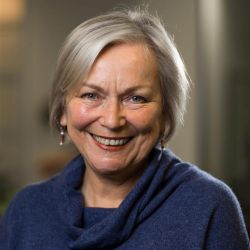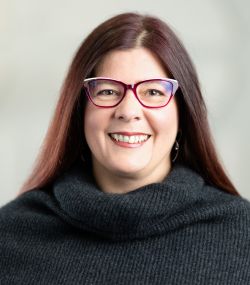The Royal Commission was supported by an Expert Advisory Group.
This group was made up of experts in child development, early childhood education and Australia’s early childhood education and care policy framework.
Roles and responsibilities
The Expert Advisory Group advised the Commissioner, shaped the areas of inquiry and supported commissioning of work by the Commissioner.
The Group met regularly throughout the Royal Commission and played an important role in ensuring the Royal Commission's findings reflect the most contemporary evidence and thinking in early childhood education and care policy, operations and outcomes.
Members of the EAG
The Expert Advisory Group was chaired by the Royal Commissioner, the Hon Julia Gillard AC.

Anne is an international development consultant with extensive experience in designing, implementing and evaluating bi-lateral programs.
Specialising in systemic reform and the development of fair and efficient education and care systems, Anne has worked for more than three decades with regional governments – including in Indonesia, Papua New Guinea, Kiribati and Vanuatu – to develop and implement reform agendas at national, state and local levels.
Anne also has specific expertise in early childhood care and education. A child advocate with a long commitment to promoting and protecting children’s rights, Anne has more than 40 years’ experience in the early childhood education and care sector as a practitioner, academic, researcher and mentor.
Beginning her academic career at the University of South Australia in 1983, Anne has been responsible for early childhood program and course development and coordination, undergraduate and postgraduate teaching and supervising higher degrees. A keen researcher committed to rigorous and ethical research, including with Indigenous communities, she is currently an Adjunct Senior Research Fellow at UniSA.
Anne is actively engaged in various organisations concerned with children’s wellbeing and is the Deputy President of the Australian Children’s Education and Care Quality Authority (ACECQA), President of the Lilian de Lissa Trust Board and was the Presiding Member of the SA Child Development Council from its establishment in 2018 until mid-2022.

Sally is a Professor at Education Futures at the University of South Australia.
Sally’s research aims to improve the healthy development and early learning of young children, with a focus on those living in diverse and disadvantaged communities. Sally undertakes research across Australia, as well as countries in Asia, Pacific regions, Latin America and the Emirates.
Sally’s expertise includes population monitoring to determine the prevalence, distribution and magnitude of inequality in child outcomes and pragmatic randomised control trials to evaluate the impact and cost effectiveness of early childhood development and education interventions. Her research has had significant global and local impact and is highly relevant for the disciplines of early education, community development, and development economics.
She works in close partnership with international governments and donor organisations, such as the World Bank, UNICEF, and UNESCO.
Sally currently sits on the South Australian Child Development Council and the Federal Education Minister’s Preschool Outcomes Measure Expert Advisory Group.
Sally has more than 200 publications, including high impact journals such as The Lancet, and has earned more than $10 million in academic funding and $30 million through a combination of international, philanthropic and government funds.
Sally is well recognised nationally and internationally in academic and policy environments, reflecting her track record in achieving highly translatable research.

Leslie Loble AM is a recognised leader of public purpose reform in Australia and the US, with a substantial track record delivering major organisational and policy innovations in education and related economic domains.
Currently, she is a director of government and not-for profit entities, Industry Professor at UTS, a Fellow of Paul Ramsay Foundation and the Centre for Policy Development, amongst other appointments.
Leslie served as Deputy Secretary in the NSW Department of Education for 20 years, driving strategy, innovation and delivery in Australia’s largest and most diverse education sector, across schooling, early childhood and tertiary education. She was long-term chair of the influential Schooling Policy Group, a core part of the Australian Education Ministerial Council, and was appointed by governments to some 20 boards and advisory committees.
Her national leadership helped shape major school funding reforms, teaching quality, literacy and numeracy assessment and VET innovations. In NSW, she led Australia's first-ever guarantee of two years' preschool and established the awarded Centre for Education Statistics and Evaluation, Centre for Learning Innovation and Catalyst Lab.
Leslie was appointed a Member of the Order of Australia (AM) in 2022, named one of Australia’s top 50 school education innovators in 2019 and an Australian Financial Review/Westpac Top 100 Women of Influence in 2013.
Prior to coming to Australia, Leslie was appointed by President Bill Clinton to high level executive roles, including Chief of Staff to Labor Secretary Robert B. Reich, Counsellor to the Secretary and acting Assistant Secretary for Policy. She holds degrees from Harvard University and Cornell University.

Danielle Wood is CEO of the Grattan Institute where she heads a team of leading policy thinkers, researching and advocating policy to improve the lives of Australians.
Danielle also leads Grattan’s Budgets and Government Program and has published extensively on economic reform priorities, budgets, tax reform, women’s workforce participation, generational inequality and reforming political institutions. She is a sought-after media commentator and speaker on policy issues.
Danielle was previously Principal Economist and Director of Merger investigations at the ACCC, a Senior Economist at NERA Economic Consulting and Senior Research Economist the Productivity Commission. She holds an Honours degree in Economics from the University of Adelaide and two Masters degrees, one in Economics and one in Competition Law, from the University of Melbourne.
Danielle is a member of the Australian Government’s Women’s Economic Equality Taskforce, the Parliamentary Budget Office Expert Advisory Committee and the Commonwealth Bank CEO Advisory Council.
Danielle is an Honorary Fellow and former President of the Economic Society of Australia and a Research Fellow of the Women’s Leadership Institute. She is also a passionate advocate for women in economics and was the co-founder and first Chair of the Women in Economics Network.

In October 2018, April Lawrie was appointed as SA's inaugural Commissioner for Aboriginal Children and Young People. The role was enshrined in legislation in October 2021 enabling the role to function with statutory powers. Commissioner Lawrie was formally re-appointed 21 October 2021 for a further 3-year term.
Commissioner Lawrie is a proud Aboriginal woman and heralds from the Mirning and Kokatha people from the Far West Coast of South Australia.
Commissioner Lawrie holds a Social Work Degree which took her early career in front line child protection work and Aboriginal foster care services. From there she moved into management roles of Aboriginal social welfare policy and programs and later took on a range of Executive Leadership roles in South Australian Government Agencies including four years as the Aboriginal Justice Director in the Attorney General’s Department, ten years as SA Health Aboriginal Health Branch Director and two and a half years as Director of Aboriginal Education.
Over the last 30 years, Commissioner Lawrie has contributed to the formation of policy at the State and National level, and excellence in service innovation and community development with regard to Aboriginal health, education, child and family services, foster care services, justice services, across the metropolitan and regional areas, including rural/remote.
Commissioner Lawrie strongly believes that we need to bring the voices of Aboriginal children and young people and their communities into how we are designing and delivering health, education, justice and child protection systems and services so that Aboriginal children and young people can flourish with their right to family and culture upheld.
The Commissioner believes that to improve services and outcomes, we need to recognise the solutions coming from our Aboriginal communities and families and act upon them in a meaningful way.

Lisa was first appointed Secretary of the Department of Education, Science and Training in 2004 by Prime Minister John Howard. She was reappointed Secretary of the Department of Education, Employment and Workplace Relations by Prime Minister Rudd, and reappointed by Prime Ministers Julia Gillard, Tony Abbott and Malcolm Turnbull.
In October 2018, Lisa was appointed Chair of headspace, the National Youth Mental Health Foundation.
In May 2019, Lisa was appointed a Director of the Future Battery Industries Cooperative Research Centre. To date, Lisa has joined the Boards of two listed companies, one private company and the Federal Government’s Naval Shipbuilding Advisory Board. She holds an Enterprise Professorship part-time at the University of Melbourne, is a Counsellor of Bond University, and sits on the Boards of several not-for-profits including Social Ventures Australia.
Lisa was made an Officer of the Order of Australia (AO) in 2011. In 2003, Lisa was awarded a Public Service Medal (PSM) for coordinating the Federal Government’s domestic response to the Bali bombings.

Professor Brett McDermott is a researcher and psychiatrist specialising in young people with mental health challenges.
As head of Tasmania’s Child and Adolescent Mental Health Service, he completed a review of the state’s support for young people. He also successfully lobbied the State Government for funding and now has $41 million to drive reforms.
Brett pioneered in 1994 one of the first public health programs in the world to screen adolescents and children for anxiety, PTSD and depression following natural disasters.
He’s now led eight major post-disaster programs in NSW, Queensland and Tasmania to better support young people experiencing the trauma of floods, cyclones, bushfires and storms. His approach has influenced post-disaster interventions globally.
During Professor McDermott’s 10 year tenure on the beyondblue Board he was a strong advocate for the national school mental health initiative. For many years he has served on the expert reference group of BeYou, the national mental health in education initiative. Further, current and past appointments include directing clinical perinatal, child and adolescent mental health services.
Brett has long been committed to improving child and adolescent mental health service delivery. He established Australia's first child and adolescent eating disorders team and is currently creating services for children in out-of-home care and youth.

